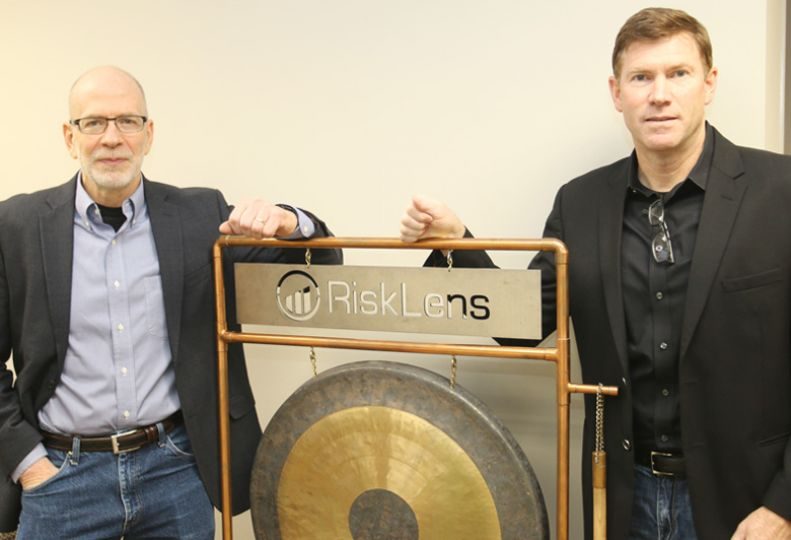
Home » Spokane cyber-risk company hits its stride
Spokane cyber-risk company hits its stride
RiskLens to triple profits by end of '16, execs say

November 3, 2016
In 2011, RiskLens Inc. co-founders Jack Jones and Steven Tabacek pitched their idea of starting a software company built to help businesses and organizations analyze their exposure to cyber risk.
It was a proposal that potential investors in Silicon Valley were excited about, but those would-be investors attached one major condition to funding.
“They would only back us if we moved to Silicon Valley,” says Tabacek, the company’s president. “They said we’d never be able to do this in Spokane. They didn’t think we’d have the engineering talent here.”
But five years later the company is thriving, with engineering graduates from Eastern Washington University, Gonzaga University, and Washington State University, Tabacek says.
Although he wouldn’t divulge exact numbers, Tabacek says the company continues to do well and is expecting to triple revenues this year over last.
“Our team is phenomenal,” he says.
And it will only continue to grow.
“We can’t hire fast enough,” says Tabacek. “By the end of 2017 we expect to have about 40 employees.”
Early on, Jones and Tabacek secured funding from Dr. Henry Beker, who is internationally recognized for creating Internet encryption.
“He’s been a phenomenal mentor and resource,” Tabacek says of Beker, who currently resides in Brussels. Beker invested $1.25 million into the company in 2013.
RiskLens currently employs 26 people, with half of them based in Spokane. It has a sales and marketing team based in Reston, Va., and a professional service department in Columbus, Ohio. Most of the company’s 48 clients are based on the East Coast, Tabacek says.
“We analyze risk for companies and help them to effectively determine the cost of that risk. The goal is to help them budget more accurately for their protection,” Tabacek says.
RiskLens uses the software as a service delivery model in which its software is licensed on a subscription basis and is centrally hosted on its secure, cloud-based server, Tabacek says.
“We use our analytical engine to help them determine their risk level,” he says.
As RiskLens has acquired more customers, the company itself is continually looking to hire more customer service support staff.
“We stay actively engaged with the C-level executives, vice presidents and managers, and technical analysts teams for all our customers,” Tabacek says. “We have to maintain continuous engagement with them. We can’t afford not to give them great service.”
Jones is the former chief information security officer for Nationwide Mutual Insurance Co., based in Columbus.He’s now RiskLens’ executive vice president of research and development and is based in Spokane.
“To my knowledge, there is no one in the world doing what we are with software,” Jones says.
With the majority of its customers in the health care, energy, retail and finance sectors, RiskLens developed software to help businesses determine just how at risk they may be to cyber-crime or accidental loss of confidential data.
The company recently moved into a 4,000-square-foot suite on the ninth floor of the Chase Building, at 601 W. Main in downtown Spokane.
Jones and Tabacek started the company in a 160-square-foot space in the basement of the former Spokane Intercollegiate Re-search and Technology Institute on the Washington State University Spokane campus.
Tabacek was the founder of IT Lifeline of Spokane, a data backup and vaulting company, before selling it in 2013 to Rentsys Recovery Systems. Tabacek and Jones first met when they worked together at Northwest Farm Credit Services in the late 1990s.
Jones left Spokane and went to work for Nationwide Mutual in 2001 and Tabacek started IT Lifeline here in 2003.
Jones says it was early in his employment as Nationwide’s chief information security officer that he realized there was no way for a business to evaluate the risk of a cyber breach or estimate how much such a breach could cost a company.
As he began to develop software to measure cyber risk, Jones also began to emerge as an authority in the digital community working as a consultant helping businesses and organizations evaluate risk to better protect themselves and their clients.
Jones is also chairman of the Factor Analysis of Information Risk (FAIR) Institute, a nonprofit organization made up of cybersecurity leaders and business experts that he helped launch.
Last month, the Federal Reserve Board, the Federal Deposit Insurance Corporation, and the Office of the Controller of the Currency announced they’re considering applying FAIR standards to depository institutions and depository institution holding companies with total consolidated assets of $50 billion or more. The proposed enhanced standards wouldn’t apply to community banks.
Jones says when he returned to Spokane and approached Tabacek about starting RiskLens, the startup market for software companies was not vibrant.
“Remember 2011, investors were putting money into the next Pinterest or the next Facebook,” Tabacek says. “But when security breaches hit Home Depot and Target in 2014, suddenly, businesses wanted to know their risk exposure. Suddenly, the time was right for us.”
Jones says RiskLens and FAIR Institute are at the forefront of trying to change an industry.
“Our staff here, they take it to heart and are dedicated to protecting our clients,” he says.
Latest News Technology
Related Articles

![Brad head shot[1] web](https://www.spokanejournal.com/ext/resources/2025/03/10/thumb/Brad-Head-Shot[1]_web.jpg?1741642753)

